Board Commissioned Expert Panels
IT Systems Expert Panel
Description:
The Social Security Advisory Board appointed an independent, expert panel to review Social Security’s efforts to modernize its information technology (IT), which is essential to delivering effective service to the public. The Information Technology Systems Expert Panel (“Panel”) examined the progress and key initiatives of the Social Security Administration’s (SSA) IT Modernization Plan, including how systems processes are developed, modified, and used by SSA. The Panel began meeting in the fall of 2019 and issued its findings in a report to the Board in December 2020. For more information, visit the IT Systems Expert Panel Report Page
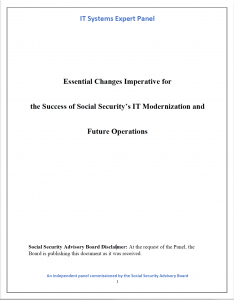 IT Expert Panel
IT Expert Panel
Members: Alan Balutis (Chair), Dan Chenok, Nani A. Coloretti, Renato (“Renny”) A. DiPentima, Martha Dorris, William (“Bill”) D. Eggers, Mark Alan Forman, Greg Giddens, Dave McClure, Jim Williams
Technical Panels on Assumptions and Methods
Description:
Since 1999 and every fours years since, the Social Security Advisory Board (SSAB) has appointed an independent, expert panel comprised of prominent economists, actuaries and demographers to review the assumptions and methods used to develop the annual report of the Social Security Trustees on the financial status of the Old-Age, Survivors, and Disability Insurance trust funds. Policymakers and the public rely on the financial projections made by the Office of the Chief Actuary and published in the Trustees Report to understand the financial soundness of Social Security’s vital programs. The Panels provide an independent assessment of the information used by the Trustees, the Chief Actuary, and program administrators to evaluate the program’s financial status and analyze how economic and demographic trends affect Social Security’s long-term solvency. Each panel makes recommendations to improve the basis for assumptions, methods and the presentation of results. The views expressed in the Technical Panel reports are exclusively those of the Panel’s themselves. In 2017, between the 2015 and 2019 four-year cycles, the Board also appointed a Panel to examine a single subject: labor force participation.
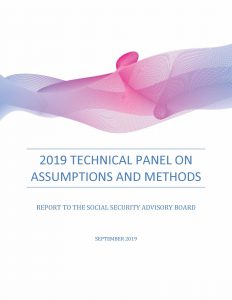 2019 Panel
2019 Panel
Members: Robert M. Beuerlein (Chair), Ron Gebhardtsbauer, Alexander Gelber, Joshua Goldstein, Patricia L. (Tricia) Guinn, Louise Sheiner, Sita Nataraj Slavov, Kent Smetters, Tom Terry
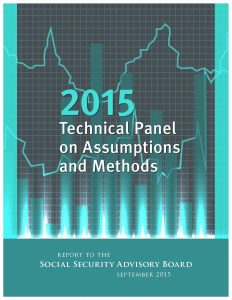 2015 Panel
2015 Panel
Members: Alicia Munnell (Chair), Katharine Abraham, David Autor, Jeffrey Brown, Peter Diamond, Claudia Goldin, Sam Gutterman, Ronald Rindfuss, Michael Teitelbaum, Joe Silvestri
 2011 Panel
2011 Panel
Panel Members:
Brigitte C. Madrian (Chair), John Bongaarts, Mark Duggan, Melissa Favreault, Tim Marnell, S. Philip Morgan, John Sabelhaus, Andrew Samwick, Karen A. Woodrow-Lafield
 2007 Panel
2007 Panel
Panel Members: Dan L. Crippen (Chair), Mary C. Daly, Robert J. Gordon, William Hsiao, Steve Lieberman, Deborah J. Lucas, Jeffrey S. Passel, Beth Soldo, P.J. Eric Stallard, Shripad Tuljapurkar
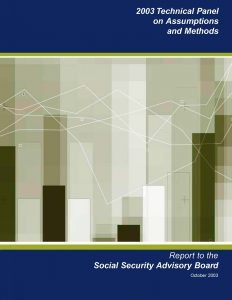 2003 Panel
2003 Panel
Panel Members: Robert L. Clark (Chair), Katharine G. Abraham, Richard V. Burkhauser, Robert J. Gordon, Stephen G. Kellison, Anna M. Rappaport, Kevin J. Stiroh, John R. Wilmoth
 1999 Panel
1999 Panel
Panel Members: Eugene Steuerle (Chair), Barry Bosworth, Edward Frees, Ronald Lee,
Deborah Lucas, David McKusick, Martha F. Riche, John Rust, Andrew Samwick, Timothy M. Smeeding, Michael Sze
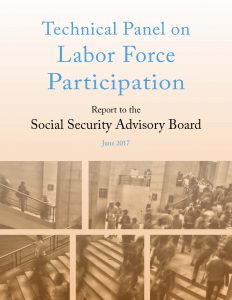 Labor Panel 2017
Labor Panel 2017
Panel Members: Robert A. Moffitt (Chair), Gary Burtless, Chinhui Juhn, Kathleen McGarry, Kevin M. Murphy,
Disability Policy Panel
Description
The Social Security Advisory Board (SSAB) appointed the independent Disability Policy Panel in 2013-2014 to review the Social Security Administration’s (SSA’s) Continuing Disability Review (CDR) process, including the Medical Improvement Review Standard (MIRS) that must be applied in conducting CDRs. In general, the Panel found the CDR an effective tool for enhancing DI and Supplemental Security Income (SSI) program integrity. CDRs not only identify beneficiaries who no longer meet program eligibility criteria but also raise awareness of SSA oversight. CDRs are highly cost-effective, providing a nine to one payback ratio of benefit savings to administrative costs. This favorable ratio results in part from SSA’s use of statistical profiling and CDR mailers that focus full medical reviews on those cases where it considers medical improvement most likely. While generally giving the CDR process high marks for fulfilling its core function, the Panel also notes that CDRs are a less useful and appropriate tool for addressing other dimensions of program integrity. Alternative tools include quality control, pre-effectuation reviews, focused reviews, and Cooperative Disability Investigation (CDI) anti-fraud units. Getting the disability determination right the first time is considerably more efficient and equitable than relying on CDRs for subsequent error correction. Based on its analysis, the Panel formulated recommendations to Congress, SSA, and the SSAB in five issue areas: 1) the funding of CDRs, 2) MIRS, 3) CDRs in relation to SSA’s other payment integrity efforts, 4) the integration of CDRs with support for return to work, and 5) CDRs issues specific to SSI children and youth.
 Disability Policy Panel 2014
Disability Policy Panel 2014
Panel Members: Bernadette Franks-Ongoy, Manasi Deshpande, Elaine Fultz, Marsha Rose Katz, Renée M. Landers, Nicole Maestas, Ken Nibali, James Smith, Arthur Spencer